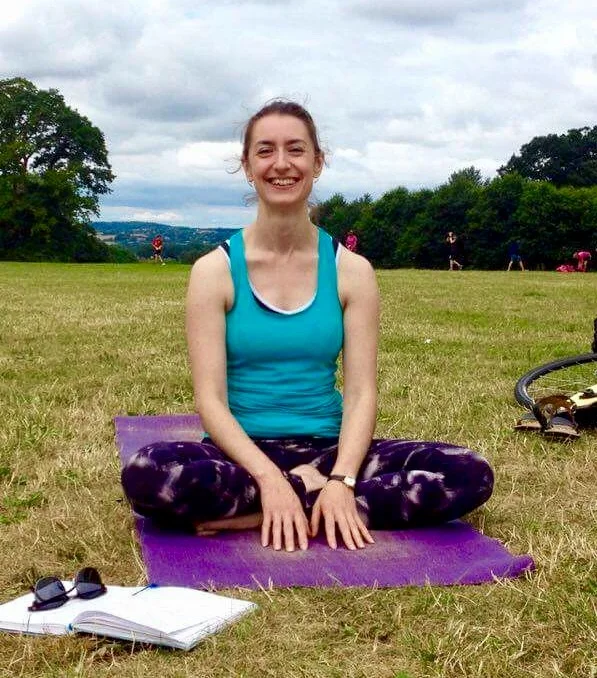Many people find traditional yoga classes intimidating
My online classes offer a warm and welcoming environment, so you can stop worrying about fitting in and start building strength and self-confidence.
Hello, I’m Becci and I used to exercise for all the wrong reasons
I used to value my body in vinyasas jumped, calories burned, steps taken, kilometres run, miles ridden, and grades climbed. I counted everything.
I might have looked the picture of health on the surface, but underneath I was chronically stressed, undernourished, and deeply unmoored from my sense of self. Yep, all of this, despite practising ‘yoga’ pretty much every day for 10 years.
I was regimented and unforgiving of any mistakes I made, while trying very hard to prove to myself that I was good enough. I avoided all the important questions I needed to ask: and instead? I went to the workshops, listened to the podcasts, watched the TED talks, read the books.
I lived in my head. My body was only good for looking at and making me feel bad.
My yoga practice wasn’t doing what I believed it was doing.
I wasn’t becoming more in tune with myself: I was distressed and—even worse—I was stuck in that distress.
My yoga practice wasn’t doing what my teachers believed it was doing either.
Sure, I could bend backwards and touch my feet to my head, but the important stuff—like eating enough, sleeping enough, resting, investing in the quality of my relationships—none of that was getting any attention.
At the peak of the most ‘advanced yogi-looking’ period of my life, I would demonstrate Eka Pada Rajakapotasana IV (King Pigeon splits) to wide-eyes at the ‘big name’ Ashtanga teacher-training intensive, before hobbling to the physio and wincing my way home. I couldn’t ignore that something needed to change. I had reached the point where I no longer wanted to force my body to fit an ideal shape largely governed by somebody else’s strict and arbitrary rules.
I had outgrown a yoga practice where my energy was mostly dedicated to looking the opposite of how I was feeling.
Giving myself the permission to question felt like unzipping a really tight pair of trousers. I was relieved. I could acknowledge that not only had I been trying to solve the wrong problem, I had also been using the wrong set of tools.
I made ‘yoga’ a smaller part of my life.
I sought help from the right people. I spent more time enjoying rock climbing, running, and cycling. I started incorporating resistance bands, body-weight exercises, yoga straps, yoga blocks, tennis balls and foam rollers into my practice. I began strength training. In my classes, we experimented with ‘traditional’ poses. We would play with balancing on rolled-up yoga mats. We would pull the benches away from the wall and learn push-ups. We would roll around on the floor.
The ‘yoga part’ of my practice became more clearly defined. I started foregrounding ethics and philosophy over postures. In class, we’d reflect on the complexities and challenges presented by modern life and what ‘yoga practice’ even means in a culture and time that is so far removed from yoga’s origin.
I was taught that yoga was a complete practice and that the steps were already laid out for me to follow, but I learned that we all need to give ourselves adequate time, space, and stimulus in order to grow.
Some days you will want to push yourself. Some days you will need to rest. Some days you won’t want to make any decisions. Some days you will want to go back to basics. Some days you will want to explore and question everything. Some days you will need a bit of gentle encouragement. Some days you will want to sack off the yoga class, go outside and run through freezing muddy puddles, or cycle up really steep hills. Some days you will want to lift heavy things. Some days you’d rather do nothing, but wrap yourself up in a blanket, pour a big glass of red wine, binge-watch Scandi crime dramas, and mourn your career in Danish policing that-never-was (no? just me?).
Congratulations! You’re completely normal. All of this is absolutely ok.
A sustainable practice is one that tends to your emotional wellbeing without wish-wash and your physical health without fads.
I couldn’t care less about how early you get up in the morning, how many times a week you practice, what shapes you can make, how long you meditate for, what you’re wearing, what you’re eating (or not eating). What I do care about is creating an environment where you can move in a way that feels best for your body and gives you enough space to pay attention to the things that matter.
I love teaching.
Teaching forces me to interrogate my own assumptions, experiment, and become more comfortable with not having everything figured out.
“I believe I have found a teacher who is genuine, considerate and self aware, someone who wants her students to benefit both physically and mentally from each practice... The icing on the cake is Becci’s ability to share her thoughts, wisdoms and experiences with relevance and humour which, to me, make for an even more enjoyable class.”









Thoughts on neglect, self-worth, and social justice
In one form or another, the sentiment of 'accepting our lot' is something we hear very often: primarily because it contains some wisdom, but also because nobody likes a whinger.